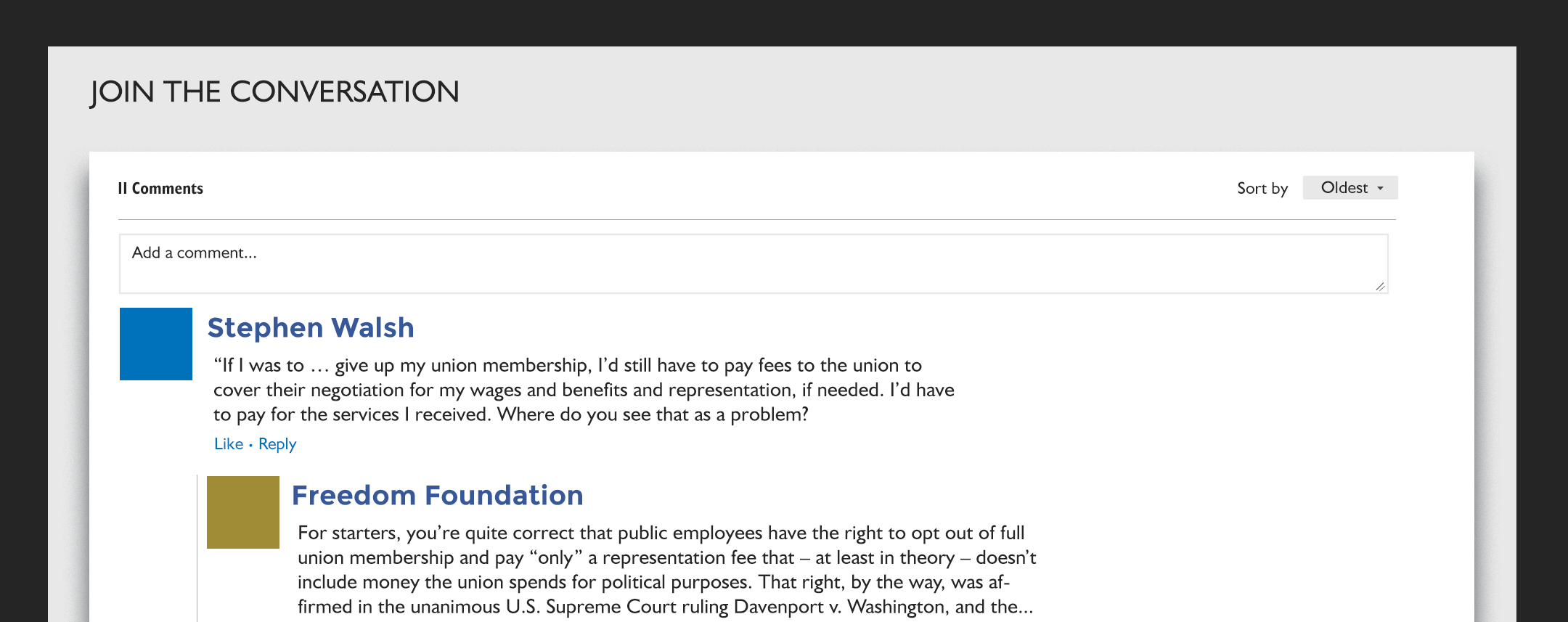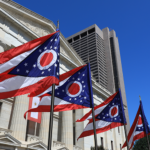The (Salem, Ore.) Statesman Journal on June 20 published an op-ed from Anne Marie Gurney, the Freedom Foundation’s Oregon director, rebutting an earlier guest opinion written by U.S. Sens. Ron Wyden and Jeff Merkley critical of right-to-work legislation.
The points she made and her complete evisceration of the senators’ weak, union-centric arguments don’t need to be recounted in this space. Instead, let’s have some fun with the online comments that followed her piece on the paper’s website.
From Stephen Walsh, a state of Oregon employee: “If I was to … give up my union membership, I’d still have to pay fees to the union to cover their negotiation for my wages and benefits and representation, if needed. I’d have to pay for the services I received. Where do you see that as a problem?
Our Response: For starters, you’re quite correct that public employees have the right to opt out of full union membership and pay “only” a representation fee that – at least in theory – doesn’t include money the union spends for political purposes. That right, by the way, was affirmed in the unanimous U.S. Supreme Court ruling Davenport v. Washington, and the Freedom Foundation actually represented the plaintiff.
But it’s one thing to issue a ruling; enforcing it is something else entirely.
While grudgingly conceding that workers can opt out, the unions do everything in their power to make the process as confusing and difficult as possible. They start by simply assuming everyone working in the field wants to be a full union member, and they automatically start deducting dues from every new worker until he or she jumps through innumerable hoops – including only considering opt-outs during a window that’s open for 15 days a year and varies from employee to employee.
Then, too, it’s left to the union to decide what percentage of its income is used for politics and how much it spends on collective bargaining. Not surprisingly, the union accdountants tend to err on the side of the latter and the difference between what one pays in full dues versus paying the representation fee only is usually small enough to discourage workers from bothering.
But there’s also a more fundamental issue at stake. As Justice Samuel Alito noted in his majority opinion in the 2014 Supreme Court case Harris v. Quinn, when a government employee union negotiates with management, the stakes are different than they are in the private sector. By definition, every dollar the Oregon Legislature spends on state employee salaries and benefits deprives another public program of a dollar’s worth of funding.
Simply put, this means that all government employee union spending is inherently political.
Which isn’t to say government employees shouldn’t have the right to unionize or collectively bargain. But those who don’t care to affiliate with the union or have any of their money used to subsidize the union’s political agenda should have the right to freely opt out.
That’s what right-to-work legislation is all about. No more and no less.
From Matthew Munoz, Salem: “Everyone who is in a respresented position benefits from the bargaining and protections the union contract that union has negotiated. So why shouldn’t they have to pay for those?
Our Reponse: So you’re saying it isn’t fair for someone to benefit from the efforts of an organization that advocates on its behalf without paying a share of its costs. Is that it?
Fine. We honestly believe every single Oregonian benefits from the efforts of the Freedom Foundation. Should we be able to deduct money from everyone’s paycheck to fund our everyday operations whether they want us to or not? How about the NRA or ALEC?
For the record, we don’t think so, either. But please explain why unions are the only exception to this common sense rule.
From Kevin Rash, Oregon State University: “Objective studies indeed show that so called ‘right-to-work’ states pay lower wages than states that aren’t.”
Our Reponse: An “objective” study from the Economic Policy Institute? In what alternate universe?
Lawrence Mishel, EcPI’s president and the author of the study cited by Rash, acknowledged in The Huffington Post his prominent status among political liberals. “When we get attacked by the Wall Street Journal editorial page, I tell my people, ‘Be proud.’ I never got listed by Glenn Beck. I felt left out because I feel like I’m an important person on the left.”
According to ActivistFacts.com, “The Economic Policy Institute (EcPI) calls itself a ‘nonprofit, nonpartisan’ think tank. But behind its façade of political balance lays an agenda-driven organization. EcPI has roots in radical leftist politics, and it receives a large portion of its funding from organized labor. EcPI’s donors have on at least one occasion been allowed to review its research prior to publication.”
To paraphrase the advice always given to new lawyers: If you have the facts on your side, argue the facts. If you have the law on your side, argue the law. If you have neither, spout union talking points.










